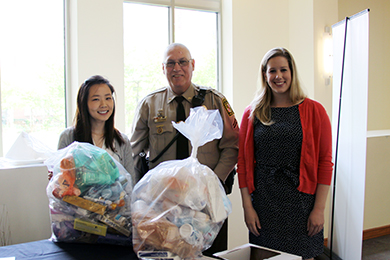Nationwide Drug Take-Back Day Sees Record-Breaking Turnout
MPC’s public education coordinator explains the importance of proper medication disposal.
By: Malissa Carroll
Thursday, May 29, 2014

With more people in the United States dying as a result of overdoses from prescription medications than from motor vehicle accidents, the Centers for Disease Control and Prevention (CDC) has declared prescription drug abuse a nationwide epidemic.
To help combat this serious public health problem, the Drug Enforcement Administration (DEA) has partnered with state, local, and tribal law enforcement officials since September 2010 to hold nationwide Drug Take-Back Days at thousands of collection sites across the country, including one at the University of Maryland School of Pharmacy, which houses the Maryland Poison Center (MPC).
“The DEA’s Drug Take-Back Day initiative strongly aligns with the mission of the MPC to decrease the cost and complexity of poisoning and overdose care, while maintaining or improving patient outcomes,” says Angel Bivens, RPh, MBA, CSPI, public education coordinator for the MPC. “The MPC is staffed by pharmacists and nurses who are certified as specialists in poison information by the American Association of Poison Control Centers. These individuals handle thousands of poisoning- and overdose-related calls each year, and strive to promote poison prevention.”
According to the Substance Abuse and Mental Health Services Administration’s National Survey on Drug Use and Health, the non-medical use of controlled substance medications is at an all-time high, with nearly seven million Americans reporting having abused prescription drugs in 2012. The study also revealed that more than 54 percent of people who abuse prescription pain relievers obtained access to those drugs through family members or friends.
However, data released earlier this month by the DEA shows that more than 780,000 pounds of medications were collected from the country’s 6,072 collection sites during its most recent Drug Take-Back Day on April 26. Student pharmacists at the School of Pharmacy, working in conjunction with the University of Maryland Police Force, collected 133.5 pounds of expired or unused prescription and over-the-counter medication at their collection site in the University’s Southern Management Corporation Campus Center, a record-breaking success for the School.
“The DEA’s Drug Take-Back Day represents an important piece of the puzzle to prevent poisonings and overdoses,” says Bivens. “Having individuals and families drop off their expired or unused medications at these events ensures that young children and teens do not have access to them in the home and decreases the likelihood of medication errors among adults and seniors.”
She adds, “Unused prescription drugs that are thrown in the trash can be retrieved and abused or illegally sold, while those that are flushed can contaminate the water supply. Proper disposal of these medications not only saves lives, it also protects the environment.”
Since its inception, this initiative has helped individuals safely dispose of more than four million pounds of prescription and over-the-counter medications, eliminating the risk for those medications to be abused or illegally trafficked.